Let’s take a look at what happened in September 2023 at RCI:
1) Annual General Meeting of the RCI, 25 – 26 September 2023
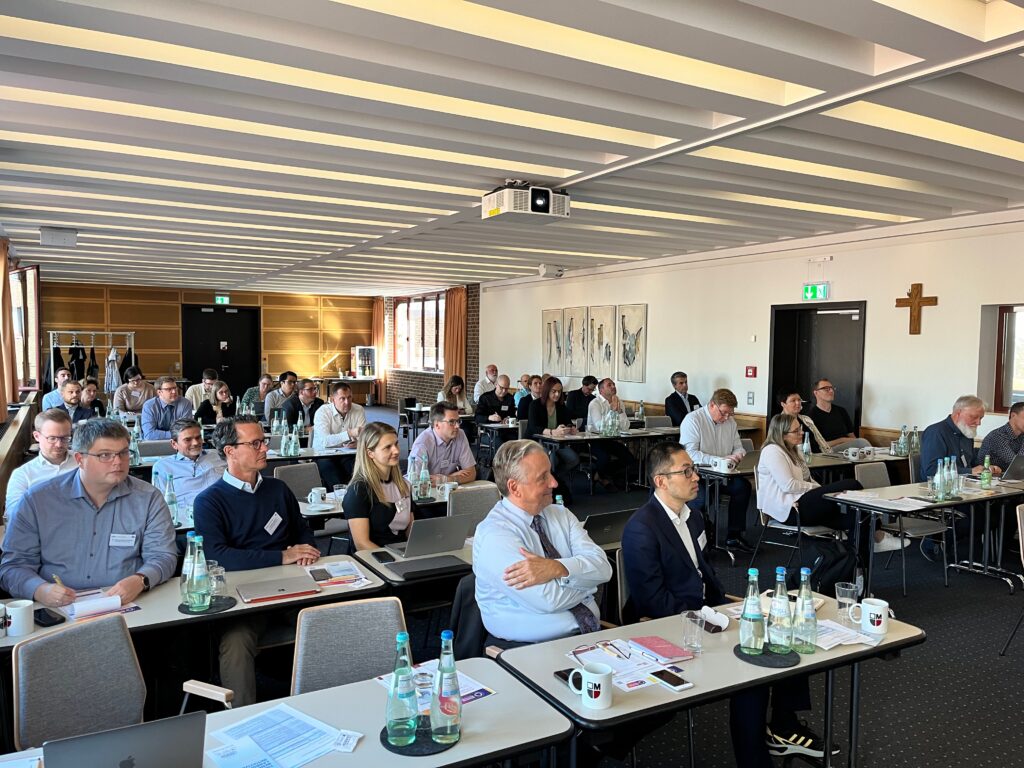
The Annual General Meeting of the RCI took place from Monday 25th September 2023 to Tuesday 26thSeptember 2023. It was a face-to-face event at the Maternushaus in Cologne, Germany.
On the first day, the RCI reviewed the previous year, discussed strategic, administrative and organisational aspects and heard its members’ opinions on relevant future activities for the coming year.
The second day (half day) was dedicated to member presentations focusing on new technologies, past experiences, novel ideas, and potentials for networking and collaboration. In total, eight presentations addressed topics as different as carbon capture and utilisation (CCU), product carbon footprints of mass balance and free attribution (MBFA), the textile sector, the coatings sector, lignocellulosis, wood-based fibers, policy barriers and opportunities, cooperation proposals and an update of the status of the Renewable Carbon Share certificate and label.

RCI members also had plenty of opportunities to network. On the evening before the General Meeting, the RCI met at the local brewery, Früh Brauhaus. This informal gathering set a relaxed atmosphere, allowing participants to initiate conversations and form connections before the official start of the General Meeting. On the first day of the event, the networking spirit continued as attendees gathered at a charming Italian restaurant for an evening of delicious cuisine and lively conversations. In between the entire two days, breaks were offered during which attendees could engage in conversations over coffee or lunch, providing them with opportunities to share information, experiences, and insights related to the renewable carbon industry. These interactions played an important role in building relationships and fostering collaboration.
2) Publication of the Scientific Background Report on “Renewable Carbon as a Guiding Principle for Sustainable Carbon Cycles – Why It Is Right and Necessary To Choose Renewable Carbon as a Guiding Principle for Sustainable Development in the Chemicals and Materials Sectors“
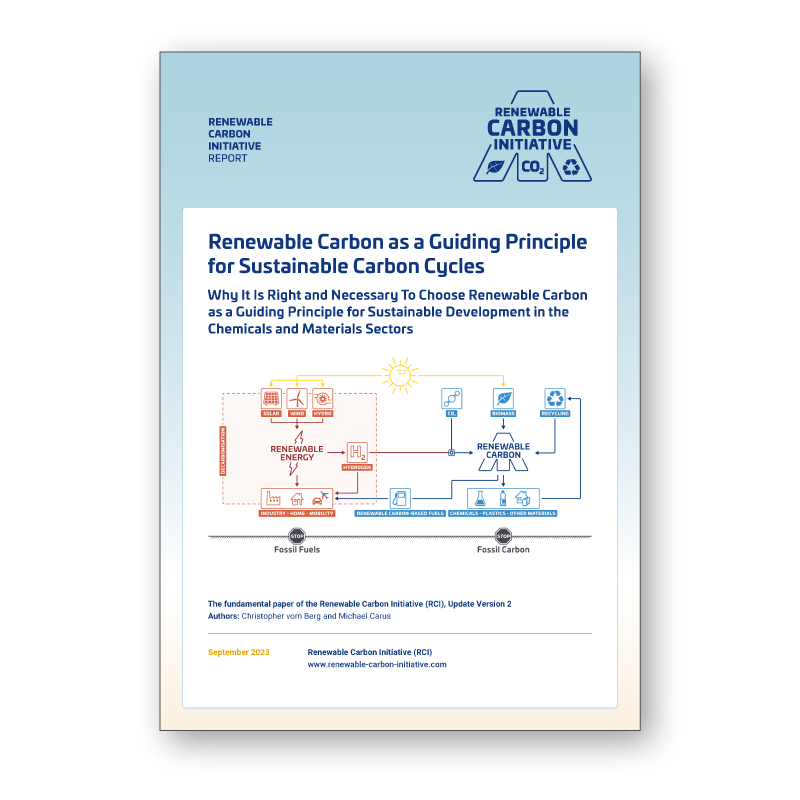
The Guiding Principle Paper was RCI’s first major publication and forms the basis for the concept and strategy of the RCI. Together with input from all members, the RCI has worked on an updated version which is now published this September. In the second edition, the following main changes have been implemented:
- Integration of latest IPCC data on greenhouse gas emissions from the 6th Assessment Report (published March 2022).
- Integration of entirely novel carbon flows data from RCI’s Carbon Flows report to establish proper data baselines.
- Sharpening, fine-tuning and concretising of the initial eleven policy recommendations through lots of feedback from talks with politicians, NGOs, industrial actors, the bio-based, CO2-based and recycling sector, energy experts and many other stakeholders. Further political demands resulted from these discussions as well as recently published RCI position papers and consultations, which are now also integrated into the paper
To reduce greenhouse gas emissions and mitigate climate change, the inflow of fossil carbon must be reduced quickly and in high volumes. The EU has started pushing for decarbonisation in energy and transport sectors, but has largely ignored chemical and material industries. These sectors require carbon-based feedstocks and cannot be “decarbonised,” so tackling embedded carbon in these industries is crucial. This paper proposes an approach to minimize environmental impact and maximize the reduction of GHG emissions.
3) Publication of RCI’s Position on the Commission Proposal for a Green Claims Directive (GCD) – Towards Science-Based Substantiation of Claims and Accurate Biogenic Carbon Accounting.
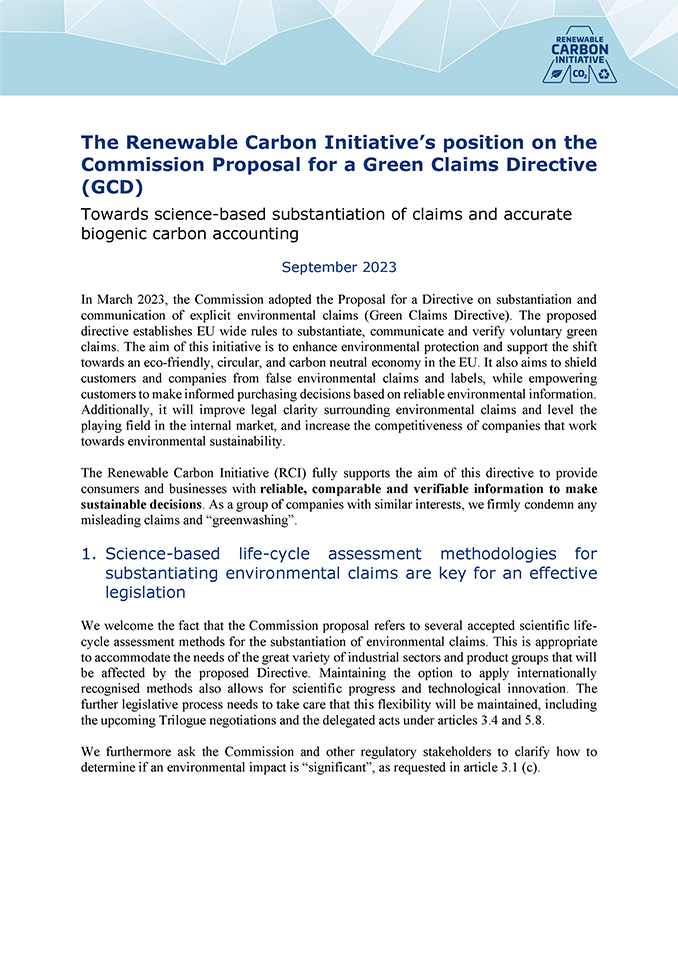
In September, the RCI endorsed the Green Claims Directive’s (GCD) mission to provide consumers and businesses with reliable, comparable, and verifiable information to facilitate sustainable choices. In the position paper, the RCI emphasised three aspects that require additional attention to maximise the impact of the GCD and support products and solutions derived from non-fossil, renewable-carbon-based feedstock from biomass, CCU or recycling.
- Science-Based Life-Cycle Assessment Methodologies: RCI welcomes the acceptance of several life-cycle assessment methods for substantiating environmental claims but emphasises the practical importance of maintaining flexibility in the upcoming trialogue negotiations. RCI also calls for clarification on how to determine if an environmental impact is considered “significant.”
- Differentiated Biogenic Carbon Accounting Methodology: The RCI advocates for enabling the possibility to better reflect uptake of atmospheric CO2 via biogenic carbon (and principally any process that captures CO2 from the atmosphere) in product assessments. In general, biogenic carbon in LCA is neither credited with carbon uptake through biomass at the beginning nor with the emissions (e.g., from incineration) at end of life. While this is from a proper LCA point-of-view valid and recommended, it leads to issues for stakeholders reporting their biogenic product’s carbon footprint at factory gate, because the uptake of atmospheric carbon cannot be shown and the conceptual advantage over fossil products gets lost. At the same time, the RCI is aware of misleading “carbon negative” claims and argue that only full cradle-to-grave LCAs should qualify for such B2C claims.
- Ensuring a Reliable Verification Mechanism: Recognising the need for mandated verification of environmental claims before B2C communication, RCI acknowledges the potential challenges posed by these resource-intensive processes. The RCI wants to stress the importance of an effective approach and an extended transition period to enable authorities, verifiers, and the industry to smoothly adapt to these processes and mitigate potential delays in communicating claims for innovative products.
4) RCI in Brussels – Ongoing Advocacy for Renewable Carbon at the European Commission
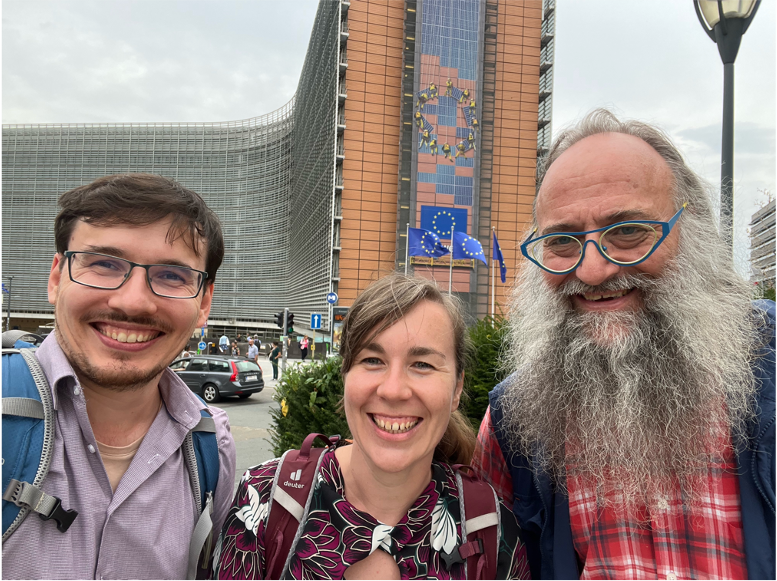
On 12 September, the Executive Office of the RCI travelled to Brussels for several meetings with the European Commission, at DG ENV, DG CLIMA and DG GROW – with the main interest in our recent publications on food crops and CCU.
With the different representatives, RCI discussed the tone of the food crop debate, land use efficiency of crops, potential improvements for the efficiency of the food system, bio-based targets from other regions of the world, collaboration with and input from the JRC, the need for CCU, synergies with and differences from CCS, future development of carbon capture, concrete ideas how to facilitate CCU, defossilisation as an overarching principle, study trips between different units of the European Commission, delivering recommendations to the next European Commission and more.
5) Recognition of RCI’s work
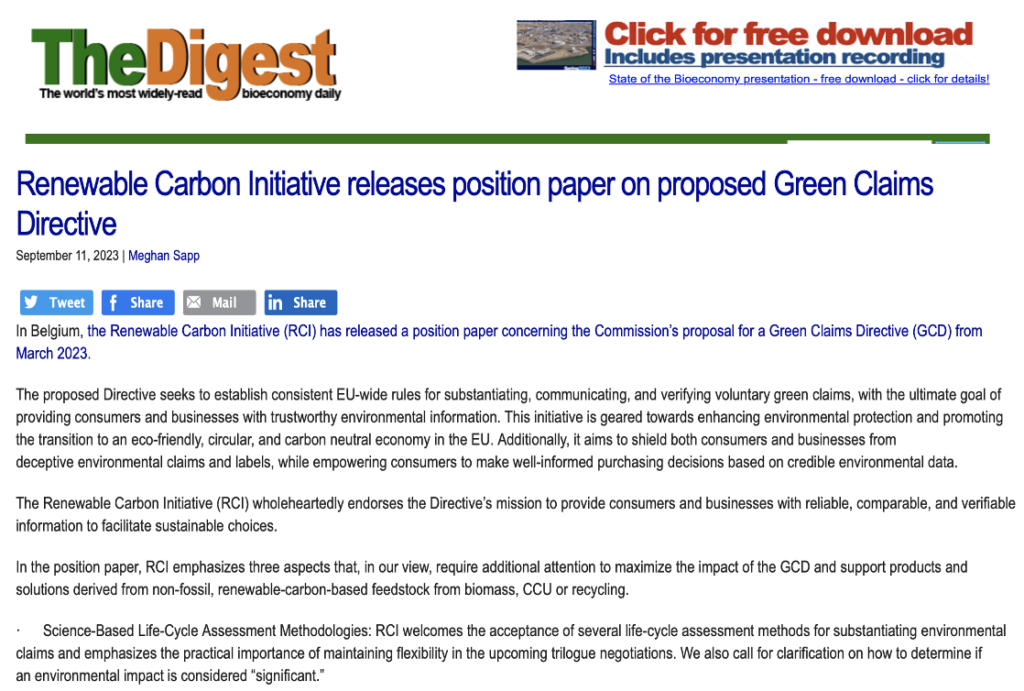
The work of the RCI consistently pays off in dividends of recognition within the press. This month, Biofuels Digest covered RCI’s Position Paper on the Commission Proposal for a Green Claims Directive (GCD) – Towards Science-Based Substantiation of Claims and Accurate Biogenic Carbon Accounting.
Find out more at: https://www.biofuelsdigest.com/bdigest/2023/09/11/renewable-carbon-initiative-releases-position-paper-on-proposed-green-claims-directive/
6) Latest RCI-Webinar with members Alfa Laval, Stahl and Borealis

During the RCI webinar on 13 September 2023, Michael introduced the Renewable Carbon Initiative and the Renewable Carbon Strategy, and focused on the latest scientific background papers, position papers, and projects of the RCI. Three members of the RCI, Alfa Laval (speaker: Francesco Montecchio), Borealis (speaker: Stephan Roest) and Stahl (speaker: Michael Costello) gave concrete examples on renewable carbon, defossilisation, and sustainable carbon cycles.
Find out more at: https://renewable-carbon.eu/publications/product/renewable-carbon-initiative-rci-webinar-slides-pdf/
7) Welcoming our newest RCI member

Continental Surface Solutions (DE) is the specialist for surface materials and the associated production technologies in the Continental Corporation. The business area offers polyamide – or rubber-coated foils, sheets and fabrics from a single source. In order to tackle the sustainability challenge, Continental plans to transform its portfolio to carbon neutral, circular products. Therefore, Continental focuses on the use of renewable raw materials and the design of recyclable products.

ChainCraft (NL) is a start-up company converting food residues (waste) into medium chain fatty acids using proprietary fermentation technology, which are or can be used in various markets ranging from animal nutrition, flavours & fragrances and food additives, agriculture, and the chemical industry to synthesize ingredients for detergents, personal care, lubricants, etc. Its products contain 100% renewable carbon and have a proven lower carbon footprint compared to either fossil based or palm based fatty acids. Moreover, its products score significantly better in Life Cycle Assessments than the traditional alternatives.
Source
Renewable Carbon Initiative, press release, 2023-09-29.
Supplier
Alfa Laval
Biofuels Digest
Borealis Polyolefine AG
ChainCraft
Continental Surface Solutions
European Commission
Renewable Carbon Initiative (RCI)
Share
Renewable Carbon News – Daily Newsletter
Subscribe to our daily email newsletter – the world's leading newsletter on renewable materials and chemicals









